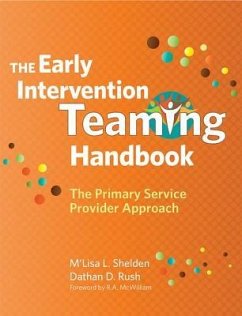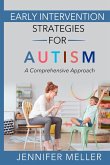M'Lisa L Shelden, Dathan D Rush
The Early Intervention Teaming Handbook
The Primary Service Provider Approach
Schade – dieser Artikel ist leider ausverkauft. Sobald wir wissen, ob und wann der Artikel wieder verfügbar ist, informieren wir Sie an dieser Stelle.
M'Lisa L Shelden, Dathan D Rush
The Early Intervention Teaming Handbook
The Primary Service Provider Approach
- Broschiertes Buch
- Merkliste
- Auf die Merkliste
- Bewerten Bewerten
- Teilen
- Produkt teilen
- Produkterinnerung
- Produkterinnerung
Developed by the early childhood experts who pioneered the primary service provider approach to teaming, this is the first how-to guide that clearly lays out the logistics and benefits of making one team member the consistent point of contact with a family. The perfect complement to the authors' bestselling Early Childhood Coaching Handbook, this practical, reader-friendly guide is your blueprint for better, more responsive care and services—and better outcomes for young children and families.
Andere Kunden interessierten sich auch für
Developed by the early childhood experts who pioneered the primary service provider approach to teaming, this is the first how-to guide that clearly lays out the logistics and benefits of making one team member the consistent point of contact with a family. The perfect complement to the authors' bestselling Early Childhood Coaching Handbook, this practical, reader-friendly guide is your blueprint for better, more responsive care and services—and better outcomes for young children and families.
Produktdetails
- Produktdetails
- Verlag: Brookes Publishing Company
- Seitenzahl: 264
- Erscheinungstermin: 5. Oktober 2012
- Englisch
- Abmessung: 279mm x 215mm x 17mm
- Gewicht: 600g
- ISBN-13: 9781598570854
- ISBN-10: 1598570854
- Artikelnr.: 36282803
- Herstellerkennzeichnung
- Libri GmbH
- Europaallee 1
- 36244 Bad Hersfeld
- gpsr@libri.de
- Verlag: Brookes Publishing Company
- Seitenzahl: 264
- Erscheinungstermin: 5. Oktober 2012
- Englisch
- Abmessung: 279mm x 215mm x 17mm
- Gewicht: 600g
- ISBN-13: 9781598570854
- ISBN-10: 1598570854
- Artikelnr.: 36282803
- Herstellerkennzeichnung
- Libri GmbH
- Europaallee 1
- 36244 Bad Hersfeld
- gpsr@libri.de
>Dr. Shelden has over 30 years of experience as a physical therapist and special educator. In addition, she received a 2000 National Institute on Disabilities and Rehabilitation Research (NIDRR) Mary E. Switzer Merit Fellowship. She is a graduate Fellow of the ZERO TO THREE National Center for Infants, Toddlers, and Families. Dr. Shelden has co‐authored several articles related to early intervention teamwork, writing individualized family service plans (IFSPs), coaching, and supporting young children with disabilities and their families in natural learning environments. She has also written a chapter related to physical therapy personnel preparation and service delivery and co‐authored a book titled Physical Therapy under IDEA (McEwen, Arnold, Jones, & Shelden, 2000; American Physical Therapy Association, Section on Pediatrics). Dr. Shelden has co‐authored a previous text Coaching Families and Colleagues in Early Childhood (with Barbara E. Hanft & Dathan D. Rush; 2004, Paul H. Brookes Publishing Co.) as well as a chapter on using a primary coach approach to teaming in Working with Families of Young Children with Special Needs (McWilliam, 2010; Guilford Press). She and Dr. Rush are co‐authors of The Early Intervention Teaming Handbook: The Primary Service Provider Approach (Shelden & Rush, 2013). Dr. Shelden has made numerous presentations nationally on topics related to IFSP development and implementation, transition, inclusion, evaluation and assessment, coaching, primary service provider approach to teaming, and provision of supporting children with disabilities and their families in natural learning environments. Dathan D. Rush, Ed.D., CCC‐SLP, has a doctoral degree in child and family studies from Nova Southeastern University, Fort Lauderdale, Florida, and a master's degree in speech‐language pathology from Oklahoma State University. Dr. Rush is currently the Director of the Family, Infant and Preschool Program (FIPP) in Morganton, North Carolina. He provides ongoing technical assistance to several statewide early intervention programs to implement evidence‐based early intervention practices in natural settings. Dr. Rush previously served as Clinical Assistant Professor at the University of Oklahoma Health Sciences Center, teaching early childhood intervention in the graduate program. He has more than 30 years of experience as a practitioner and early intervention program director and has managed a number of training contracts with various state agencies and organizations. He served as an editorial board member of Infants and Young Children until 2002 and has published articles in the area of coaching families in early intervention, in‐service training, and teaming in early intervention. He is also a past president and former executive council member of the Oklahoma Speech‐Language‐Hearing Association. Dr. Rush has presented numerous workshops nationally on topics related to writing and implementing individualized family service plans, team building, using a primary service provider approach to teaming, coaching, and supporting young children with disabilities and their families in natural learning environments. Dr. Rush has also co‐authored a previous book on coaching in early childhood intervention as well as a chapter on using a primary coach approach to teaming in Working with Families of Young Children with Special Needs (McWilliam, 2010; Guilford Press). He and Dr. Shelden are co‐authors of The Early Intervention Teaming Handbook: The Primary Service Provider Approach (Shelden & Rush, 2013). Robin McWilliam is the originator of the Routines‐Based Model, implemented in 10 countries and many states in the U.S. He is a professor of special education at The University of Alabama, where he founded and directs the Evidence‐based International Early Intervention Office (EIEIO). He is also the founder and leader of the RAM Group, an international community of practice fostering the Routines‐Based Model. He has formerly been a professor of pediatrics at Vanderbilt University Medical Center, a senior scientist at the Frank Porter Graham Child Development Institute, and a professor of education at the University of North Carolina at Chapel Hill. Dr. McWilliam's research centers on infants, toddlers, and preschoolers with and without disabilities, with a specific focus on child engagement, service delivery models, and collaboration with families. He has provided consultation, training, and technical assistance across the United States and in some countries overseas on providing early intervention in natural environments and on the Engagement Classroom Model. His Routines-Based Interview (RBI) is a widely used method of assessing families' needs and developing individualized family service plan (IFSP) outcomes and individualized education program (IEP) goals.




